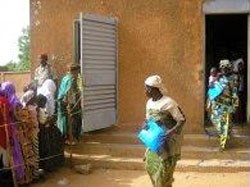
Top stories






More news














Logistics & Transport
Uganda plans new rail link to Tanzania for mineral export boost










This deal marks the inaugural transaction of the Pledge Guarantee for Health (PGH), a new financial tool developed by the UN Foundation, with help from Dalberg Global Development Advisors, and funded by the Bill & Melinda Gates Foundation, that streamlines the procurement of lifesaving health supplies. The $4.8 million (about R35 million) deal will provide anti-malaria bed nets to 1.6 million people and potentially avert tens of thousands of malaria cases, saving the lives of thousands of children in Zambia, who are more at risk of catching malaria during the rainy season.
Kapambwe Simbaoof, Minister of Health for the Republic of Zambia said, "Congratulations and many thanks to the partners who worked quickly and efficiently to pilot this innovative finance mechanism in Zambia. This coordinated and rapid response accelerated the distribution of malaria control interventions and ultimately saved lives in my country."
"The process is new, but the goal of Pledge Guarantee for Health is simple: to more quickly and effectively reduce childhood deaths from easily preventable diseases," said Kevin Starace, executive director of Global Health Innovation at the UN Foundation. "The PGH helps streamline the flow of aid dollars, reducing inefficiencies and premiums that governments pay on health commodities due to bottlenecks in the grant disbursement process."
PGH facilitates short-term loans to developing country recipients on the basis of pending aid commitments. This enables recipients to avoid stock-outs, emergency shipments, and high costs that can arise when they must wait for funding to replenish supplies of critical medicines. The PGH is flexible, and transactions are structured to accommodate needs of both recipients and donors. Thanks to PGH facilitating the process and guaranteeing the bank loan, health supplies are procured up to eight months faster, and commodity premiums are reduced by up to 83%.
"We applaud the efforts of countries like Zambia and development partners to create a system that gets health aid to where it's needed fast and in time to avert emergencies," said Eva Jarawan, health manager for the World Bank's Africa Region. "Innovative financial mechanisms like the Pledge Guarantee can make a real difference in delivering anti-malaria bed nets and other vital health supplies quickly and efficiently to communities which need them the most."
In Zambia, once the guarantee was issued, it took the government of Zambia and UNICEF less than three weeks to deliver the bed nets to the district-level.
Richard Gush, head of Standard Bank Africa Corporate Investment Bank, said that the Bank was proud to be part of a partnership that will save lives. "We are privileged to be involved in this project, the first under the auspices of the PGH, and to be able to contribute through providing a financial solution that could help solve a continental problem.
"As the largest bank in Africa by assets and market capitalisation, we recognise that the African private sector has a leadership role to play when it comes to creating solutions to meet Africa's development challenges."
"While Zambia has made tremendous progress in malaria prevention in recent years, the recent resurgence reported by the World Health Organisation highlights the need to remain vigilant and ensure that nets are not only financed, but arrive on time," said Ray Chambers, the UN Secretary-General's Special Envoy for Malaria. "The success of this innovative deal provides us with an important new tool in the fight to end deaths from malaria by 2015."
The percentage of Zambian households owning at least one anti-malaria bed net increased from 38% in 2006 to 64% in 2008. With the additional bed nets, Zambia will be able to make more progress toward achieving the health-related Millennium Development Goals.
The Bill & Melinda Gates Foundation investment in PGH is part of an initiative announced last year that commits a total of US$400 million (about R2.8 billion) in program-related investments (PRIs) during a two-year period to deepen the impact of the foundation's work through non-traditional means. These include the use of financial tools such as low-interest loans, loan guarantees and equity investments to secure financing for the charitable activities of select organisations and programs that fall within its core focus areas.